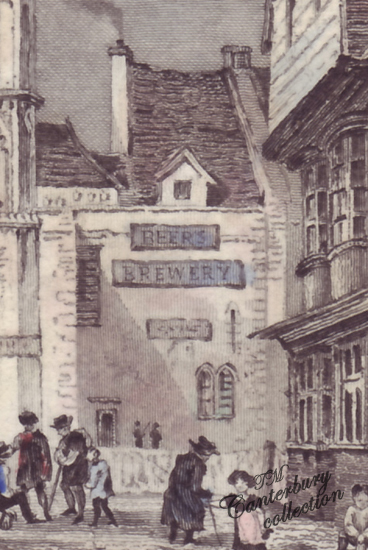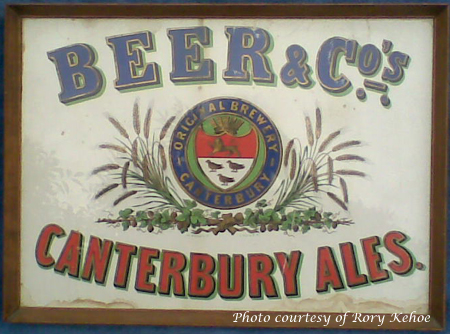
![]()
~ ALFRED BEER & CO. ~
CANTERBURY
Alfred Beer & Co is listed as being founded in 1770

It was actually founded in 1770 by a Mr. (?John?) Hill and the brewery
was situated within the actual St. Augustine's
Monastery gateway!
In 1796 Mr. Hill's son, John, ran the St. Augustine's Brewery and took
a Mr. John Sauders Bennett as partner. John Hill was replaced as partner
by Mr. William Beer, a local grocer. On 22nd December 1826, the Kentish
Gazette reported the dissolving this partnership.
Mr. Bennett went on to run the Longport Brewery and Mr. Beer carried
on/successfully expanded the St. Augustine's Brewery, despite disapproval
from the more religious-minded, puritanical types!
In 1844 the St. Augustine's site was purchased by Mr. A.J. Beresford-Hope
MP who helped found the Missionary College there in 1848. William Beer
had to move his brewery to a new site, located at 9, Broad Street, with
his eldest son George as partner.
This partnership was dissolved in 1850 and George founded the Star
Brewery at 112, Broad Street. This would suggest that there was
a rift in the family, though I can't evidence this. I would imagine
that this is when William Beer started using the term Original Brewery.
William then took his younger son, Alfred as his partner. Alfred was
noted cricketer, local Councillor and was elected Sheriff in 1869/70.
Though William died in 1871, The Original Brewery went on to win several
Gold Medals for its beers but was poorly administered and declared bankrupt
in 1891.

Le Blond
print
of about 1880 from Rory's collection
The Original Brewery and 18 licensed properties were placed in the administration
of Mr. Thomas C Cox, a local Solicitor, who sold them to Mr. Alfred
Walton, a hop merchant from Southwark, London. Mr. Walton sold the Original
Brewery in 1894 to B.C. Bushell & Co of the Black Eagle Brewery,
Westerham which continued brewing in Canterbury until 1899 whenthe
premises were sold to the Idris Mineral Water Company. B.C. Bushell
retained (111?) Broad Street as a depot until 1905.
The Original Brewery building survived as a light industrial building/warehouse
until c.1978 when it was demolished and replaced by the Magistrates'
Court the premises were sold to the Idris Mineral Water Company. B.C.
Bushell retained (111?) Broad Street as a depot until 1905.
George Beer & Co merged
with W.E. & J. Ridgen of Faversham in 1922 and the Star Brewery
was closed, then demolished in 1936.
George Beer & Rigden traded successfully, until acquisition by Fremlin's
of Maidstone in 1948. Fremlin's was bought by Whitbread's in 1967 and
their Faversham Brewery continued brewing until 1990. It's now a Tesco
supermarket!
*The information above has been kindly supplied by Rory Kehoe
The tea-gardens connected with the public-house adjoining the brewery, and part of the sacred building of St. Augustine, on Lady Wootton's Green, presented, at the time I am referring to, a kind of Cremorne on a small scale. Fireworks, balloons, and the Blondin of those days, attracted crowds of Canterbury lads and lasses, and the old people as well - for it is most observable that at all our places of amusement devoted almost exclusively to young persons, there will be found not a few venerable-looking men and women, who appear to be quite as much delighted with what is going on as the young people.
St. Augustine's brewery! (for so it was designated; what would the grand old saint have said to such degredation?) - was at the time rented by the father of a schoolfellow of mine of the name of Beer, a somewhat singular coincidence, and will afford a hint to Mr. Lower, in a new edition of his interesting work on "Surnames."
I can say with very much pleasure that having enjoyed the entree to this establishment at all times, I can record the many happy hours spent in the fine old building, often climbing its lofty towers, which are even now in a fine state of preservation, to look out upon the splendid view to be obtained from the summit; and many a draught have I had of the good home-brewed, wholesome beverage manufactured under its roof.
The brewery has been removed, and the building reclaimed from its adder of malt and hops to some of its primal sanctities. The brewer, who heartily welcomed me within its sacred walls, is dead; his son my schoolfellow, carries on the business at a short distance from the original spot: he hardly recognized me a few years since, when I called to renew the acquaintance of our early days, and to remind me of some of my juvenile reminiscences."
Passages from the auto-biography of a "man of Kent" Robert Cowtan 1866